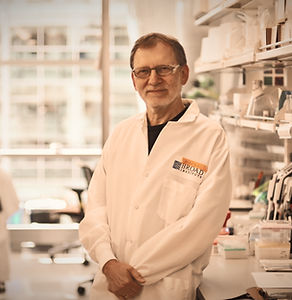The Słabicki Laboratory is dedicated to expanding the druggable proteome by employing functional genomics and targeted protein degradation. We harness the body’s own waste disposal machinery, especially the E3 ligases that can flag malfunctioning proteins for disposal, to develop new treatments. Leveraging our extensive expertise in functional genomics, cell biology, bioinformatics, molecular biology, chemical biology and biochemistry, we reprogram the ubiquitin-proteasome system to identify and characterize novel therapeutic modalities. Our work enhances our fundamental understanding of biology and enables the creation of new treatments for diseases that currently lack therapeutic options.
Our lab is located at the Krantz Family Center for Cancer Research within the Mass General Cancer Center and the Cancer Program at the Broad Institute of MIT and Harvard.
Research
Targeted protein degradation (TPD) is an exciting and novel pharmacological modality in which the ubiquitin proteasome system (UPS) is reprogrammed to induce depletion of targets that are often otherwise undruggable. Unlike traditional occupancy-based inhibitors, TPD utilizes event-based pharmacology, degrading multiple target protein molecules with a single drug molecule, possibly enhancing clinical effectiveness. Two main classes of degraders exist. First, monovalent molecular glue degraders - such as the clinically-used thalidomide, lenalidomide, and pomalidomide - were discovered to work by binding to an E3 ligase and degrading neo-substrates. Second, PROteolysis TArgeting Chimeras (PROTACs) are rationally designed bi-functional molecules that contain two moieties: one that binds to a target protein and one that engages an E3 ubiquitin ligase.

My laboratory will advance both foundational knowledge and therapeutic innovation in protein degradation by developing new approaches and establishing new workflows. For example, we have extensively optimized a generalizable fluorescent reporter and flow cytometry-based CRISPR screening method to identify genes that regulate the post-translational stability of any protein of interest. By elucidating the mechanisms governing target-ligase interactions, we aim to expedite the discovery and optimization of promising drug candidates.
FDA approved degrader


Cyclin K degrader bypassing a classical ligase substrate receptor


Inducer of BCL6 polymerization and degradation


Oligomerization Switch

Human E3 ligase – SARS-CoV-2

The Słabicki Lab’s future research will use high throughput chemical genomic approaches to systematically dissect the protein homeostasis machinery for clinically relevant targets. We will further elucidate the mechanisms governing protein-ligase interactions, establish comprehensive E3-ligase target maps, and expand the array of targets amenable to small molecule-mediated degradation.


Słabicki Lab Opening – We Are Hiring!
We are excited to announce the opening of the Słabicki Lab is opening at Krantz Family Center for Cancer Research, Massachusetts General Hospital Cancer Center. We offer a collaborative research environment that encourages scientific creativity, rigorous inquiry, and impactful discoveries.
We are looking for individuals who share our passion for scientific innovation and are eager to contribute to groundbreaking research. If you are interested in joining the Słabicki Lab and contributing to cutting-edge science, please contact us. We look forward to welcoming talented researchers to our team!
Featured Publications
-
Pellman J, Goldstein A, Słabicki M. Biochem Soc Trans. 2024 Sep 2:BST20230324. doi: 10.1042/BST20230324. Human E3 ubiquitin ligases: accelerators and brakes for SARS-CoV-2 infection. PMID: 39222407
-
Zou C, Yoon H, Park PMC, Patten JJ, Pellman J, Carreiro J, Tsai JM, Li YD, Roy Burman SS, Donovan KA, Gasser J, Sperling AS, Nowak RP, Fischer ES, Davey RA, Ebert BL, Słabicki M. # The human E3 ligase RNF185 is a regulator of the SARS-CoV-2 envelope protein iScience. 2023 May 19;26(5):106601. doi: 10.1016/j.isci.2023.106601. Epub 2023 Apr 8. #Corresponding author.
-
Nitsch L, Jensen P, Yoon H, Koeppel J, Burman SSR, Fischer ES, Scholl C, Fröhling S, Słabicki M.# BTB-BCL6 dimers as building blocks for reversible drug-induced protein oligomerization. Cell Rep Methods. 2022 Apr 13;2(4):100193. doi: 10.1016/j.crmeth.2022.100193. eCollection 2022 #Corresponding author.
-
Słabicki M*, Yoon H*, Koeppel J*, Nitsch L, Burman SSR, Di Genua C, Donovan KA, Sperling AS, Hunkeler M, Tsai JM, Sharma R, Guirguis A, Zou C, Chudasama P, Gasser JA, Miller PG, Scholl C, Fröhling S, Nowak RP, Fischer ES, Ebert BL. Small molecule-induced polymerization triggers degradation of BCL6. Nature. 2020 Nov 18. doi: 10.1038/s41586-020-2925-1. PMID: 33208943 *Co-First Author.
-
Słabicki M*, Kozicka Z*, Petzold G*, Li Y, Manojkumar M, Bunker R, Donovan KA, Sievers QL, Koeppel J, Suchyta D, Sperling AS, Fink EC, Gasser JA, Wang LR, Corsello SM, Sellar RS, Jan M, Gillingham D, Scholl C, Fröhling S, Golub TR, Fischer ES, Thomä NH, Ebert BL The CDK inhibitor CR8 acts as a molecular glue degrader depleting cyclin K. Nature. 2020; PMID: 32494016 *Co-First Author.


Słabicki Lab is located at Krantz Family Center for Cancer Research, Massachusetts General Hospital Cancer Center, Charlestown and at the Broad Institute, Cancer Program, Cambridge.
e-mail: mslabicki (at) mgh.harvard.edu
Słabicki Lab
MGH Cancer Center
149 13th Street
Office 7.405
Lab 7.330
Charlestown MA 02129
phone: +1 617-643-0258
Słabicki Lab
Broad Institute
Cancer Program
Office 6151
300 Binney Street
Cambridge MA 02142











